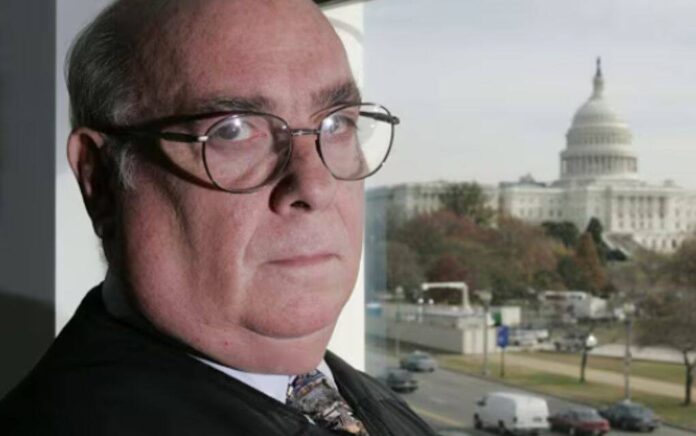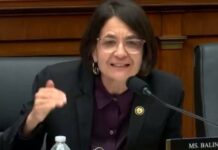
The courts have completely lost their minds. Some rogue judges are wading into politics rather than justice.
And now a federal judge has been utterly disgraced for an insane ruling on President Trump.
Trump’s Executive Power Under Fire
The Trump administration’s efforts to govern decisively are once again facing judicial pushback, raising serious questions about the judiciary’s role in constraining the executive branch’s legitimate authority. On Tuesday, United States Senior District Judge Royce Lamberth, a Reagan appointee, struck down President Donald Trump’s January 20 executive order prohibiting the Bureau of Prisons from providing sex reassignment surgeries for inmates.
The ruling, grounded in the Administrative Procedures Act, has sparked debate about whether courts are overstepping their bounds, undermining the executive’s ability to enact policy. George Washington University law professor Jonathan Turley, speaking on “Fox and Friends” Wednesday morning, called out the judge’s approach, criticizing what he described as unnecessary “hyperbole” in the decision.
Turley’s critique highlights a growing tension: the executive branch, tasked with running the nation, faces constant roadblocks from judges who appear to prioritize personal or ideological agendas over legal restraint. “A lot of citizens have difficulty with this, I think many in Congress would like to see this change,” Turley told co-host Lawrence Jones. “It may be difficult for the Trump administration to dislodge this in court. You have medical recommendations to deal with what is called gender dysphoria. And these doctors have submitted material that says, look, this is a legitimate mental illness, and, if it is, then you have to be able to treat it while in prison. That may be difficult to dislodge as it goes up on appeal. It may require Congress to intervene.”
The ruling, while potentially defensible on narrow legal grounds, risks eroding public trust when judges lace their opinions with excessive rhetoric, as Turley suggests Lamberth did. The Trump administration’s policy on transgender inmates is truly just to align government policy with what the general American public already believes to be good and right on this issue.
During the 2024 campaign, Trump’s team ran ads spotlighting Vice President Kamala Harris’s advocacy for providing sex reassignment surgeries to transgender prisoners, a stance that many voters found contentious. This proved to be one of the most effective ad campaigns in the swing states, according to analysis of voter data and surveys conducted after the 2024 elections were over.
By issuing an executive order to halt such procedures, Trump aimed to deliver on campaign promises and assert executive prerogative. Yet, Lamberth’s ruling threatens to nullify this directive, raising questions about whether the judiciary respects the president’s constitutional authority to set policy within federal agencies.
Turley’s comments on “Fox and Friends” point to a deeper issue: the judiciary’s increasing tendency to issue rulings that read more like political statements than neutral applications of law. “I felt that the opinion drifted into hyperbole and this is a problem we’re seeing with a lot of judges, where they are essentially virtue signaling through their opinion,” Turley said. “And I think that’s a terrible mistake. If you want to say, look, this is a mental illness and we have got to go with the recommendation of doctors, I can understand that. One can disagree with it. Maybe Congress wants to do something about it. But I don’t think that this is a license to have language of that type.” When judges indulge in such rhetoric, they risk undermining the executive’s ability to govern effectively, leaving the public questioning whether courts are serving as impartial arbiters or activist roadblocks.
These sweeping court orders, which halt executive actions across the country, have become a recurring obstacle to the president’s agenda. From immigration to federal workforce reductions, the Trump administration has faced a barrage of legal challenges that threaten to paralyze the executive branch. As Turley noted, the Supreme Court recently heard arguments on this very issue, specifically regarding Trump’s birthright citizenship order. “That’s exactly what we are waiting for from the Supreme Court. They had an argument in the birthright citizenship case to look at national and universal injunctions,” he said. The court’s forthcoming decisions could clarify the extent to which judges can block executive actions, a critical issue for restoring balance to the separation of powers.
The executive branch’s authority to enact policy is a cornerstone of democratic governance, reflecting the will of the electorate. When courts issue rulings that appear to prioritize ideological agendas over legal reasoning, they weaken the presidency’s ability to function as the Constitution intended. Turley’s remarks underscore the need for judicial restraint, particularly when rulings risk alienating citizens who expect their elected leaders to have the power to govern. The Trump administration’s efforts to reduce the size of the federal government, as Turley referenced, are another example of executive priorities facing judicial scrutiny. “They also have that case in front of them where the Trump administration is saying we have a right to do reductions in force. We have a right to reduce the size of federal – of the federal government,” he said.
If the president, duly elected to lead, cannot implement policies without facing immediate and sweeping judicial intervention, the executive branch’s legitimacy is called into question. The Supreme Court’s upcoming rulings on nationwide injunctions and executive authority will be pivotal in determining whether the judiciary respects the president’s constitutional role. As Turley put it, “We’re waiting for those decisions and I got to tell you, we have been waiting too long for the Supreme Court to bring clarity to this area.” The public deserves a system where the executive can act decisively, free from judicial overreach that stifles governance.
For the Trump administration to succeed in delivering on its mandate, the courts must allow the executive branch the latitude to implement its policies. The presidency is not a ceremonial office; it is a position of action, entrusted with the responsibility to lead the nation. When judges issue rulings laden with what Turley calls “hyperbole,” they risk undermining not only the Trump administration but the very framework of executive authority. The American people, through their votes, have empowered the president to make tough calls—whether on prison policies or federal workforce reductions. The judiciary must respect that authority, lest it erode the public’s trust in the government’s ability to function.
The Federalist Wire will update you on any major updates from the Trump administration.



















